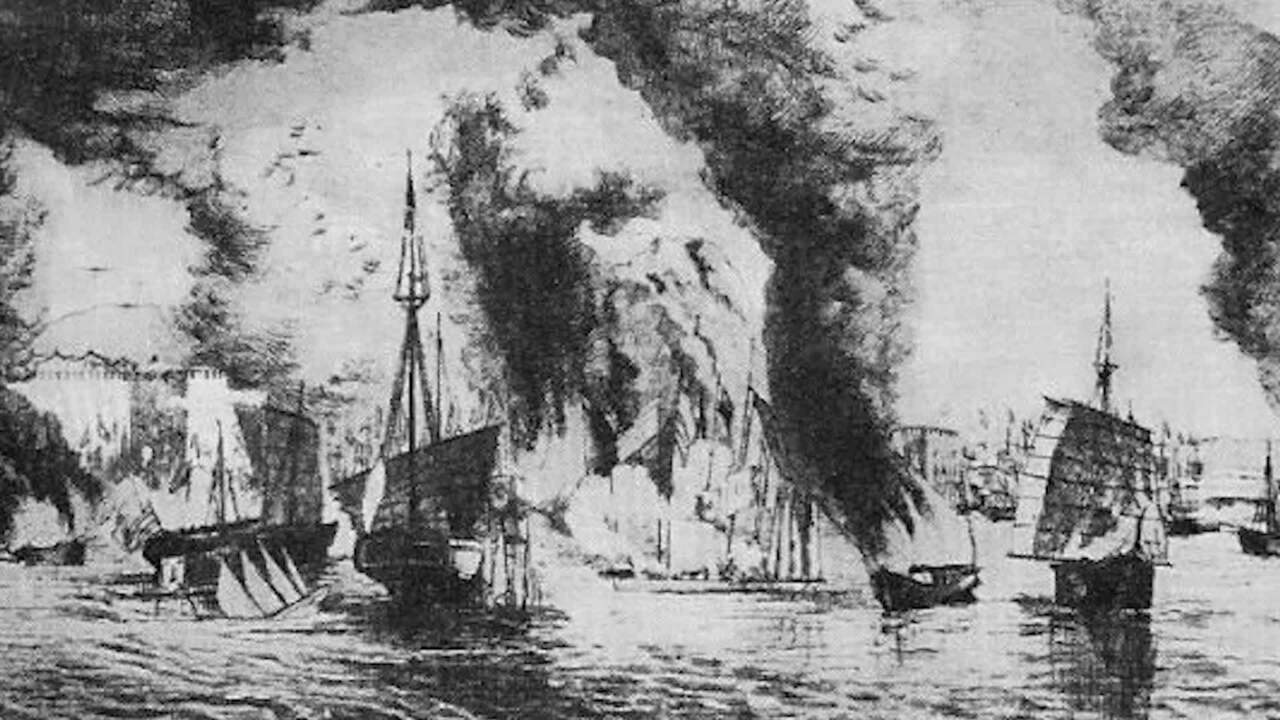Breadcrumb
This resource is part of:
The Era of Modernization in China Part One: Fall of the Qing Dynasty
At a Glance
Language
English — USSubject
- Social Studies
- Culture & Identity
The Era of Modernization in China Part One: Fall of the Qing Dynasty

If you want to characterize what happened in China between the late 19th century and the outbreak of World War II in 1937, it's really a story of China as a country that is trying to find modernity. Now "modernity" is one of those words that we use often in a slightly vague, slightly broad fashion-- but actually, for the Chinese, it had a real urgency during that period. And the reason for that was that China, for the first time in hundreds of years, found itself as a victim in the international system.
Some way through the mid-19th century, Westerners arrived in China. People with military power behind them-- the British with their gunboats-- forcing China open, not only to sell opium, one of the products that they were very keen to push inside China, but also to bring a whole variety of new ideas and ways of operating. And while there was much about this that opened China to a wider world, we have to acknowledge that it happened at the point of a gun, and this was something that really terrified and concentrated the minds of the Chinese.
And so, in the early 20th century, you see a whole variety of experiments in thought-- the Chinese, thinking about their situation and working out how they could fight back against a world which seemed to have dominated them. And the products of that thinking were often very rich. For a start, we get the emergence of nationalism, one of the most important forces in the China of the time, and actually one that really has a great deal of significance even today.
And so, in the late 19th century and the early 20th century, you'd find a whole variety of Chinese who argued that what China needed to do was to reconstitute itself, in many ways, along the lines of a Western country. And for many of these Chinese, one of the great mentors of that time was Japan, a country just across the sea which had managed very rapidly to modernize itself-- in terms of government, in terms of technology, in terms of education.
Much of the early 20th century in China is really the story of a country trying to come into being as a nation-state. It was a traditional empire that had existed under the emperors for many, many centuries. In 1911, the last emperor was overthrown, and after that China became a new fledgling republic-- Asia's first republic, as it happened-- which tried one way or another to work out how the problems of increased military strife within the country and imperialist attacks from outside could be dealt with, could be fought back against. This is really the central political and social narrative of China during those decades.
China's push toward modernization began when the Qing dynasty, then current rulers of a 2000-year-old empire, started to crumble. The first major blow to the Qing reign came in the mid-19th century, a time when imperialist Western forces were looking to increase trade and influence with countries in the East. The Qing had been trading silk, porcelain, and tea with the British Empire for centuries. But as the dynasty was largely self-sufficient, its merchants only accepted silver as a form of payment.
This created a massive deficit in Britain until the British realized the demand for opium in China. The Qing's attempt to stop the flow of opium resulted in two major wars that would change its relationship with the West-- the Opium Wars. Although the Qing outnumbered their attackers about 10 to 1, they were no match for the high-powered British Navy, and their swift defeat greatly affected the dynasty's prestige.
Worse though, a series of unequal treaties forced open China's ports for colonial trade to the British, French, and American forces more than ever before. They also allowed foreign Christian missionaries to travel and settle freely, and granted foreigners protection from local laws. As Western forces weakened the country from the outside, anti-Qing sentiment and movements within China grew dramatically.
A real turning point moment for the last dynasty of China, the Qing, was the Taiping War from the early 1850s up to 1864. It was quite possibly the single bloodiest civil war ever in history.
Tens of millions of Chinese died as the Qing and Taiping fought brutally for control of the empire. The Taiping fought so capably that, in order to defeat them, the Qing had to invite the provincial leaders within China to bring their own armies into war, independent from the Qing army. The war culminated in 1864 in a tremendously bloody battle in Nanjing.
In the end, the Taiping threat to the Qing was finally put down, but it was put down at great cost to the Qing because they had let a particular sort of genie out of the bottle. By allowing the provincial leaders of China to set up their own armies, they had set the seeds for an acknowledgment that the central government no longer had the power to control things from Beijing, from the capital.
And eventually, the emergence of these local armies would lead to a phenomenon that became associated with early 20th century China, what's often called "warlord-ism." In other words, the idea that each province of China might have its own strongman in charge-- with his own army-- who would pay very little attention to the central government, because he had plenty of men on horseback behind him.
Another movement that arose at the turn of the century calling for the end of the Qing rule was a peasant revolt that came to be called the Boxer Uprising. The Boxers, a self-described spiritual group from northern rural China, believed the rise in Chinese Christianity and the influence of Western powers in the region were responsible for the grueling period of drought and economic hardship that had befallen them in the years following the Taiping War. They attempted to bolster the power of the dynasty by violently forcing foreigners and Chinese Christians off their lands. The plan backfired quickly, unintentionally exacerbating problems for the already weakened dynasty.
Although this started as a peasant uprising in the more rural parts of northern China, it actually turned into a huge international incident-- because of course when they started attacking Chinese Christians, and when ultimately they besieged the foreigners in the embassies-- the legations of Beijing-- the foreign community struck back with 20,000 soldiers sent from a variety of different countries, including not just the West, but also Japan.
The Boxers, and also the Qing dynasty who supported them, were basically defeated pretty comprehensively. As a result, not only was the dynasty humiliated, but a huge financial penalty was placed upon the Chinese state. And this economic burden, known as the Boxer Indemnity, a huge fine that was basically put upon the Chinese state, was one of the things that pushed it even further towards economic bankruptcy.
The dynasty, now reeling from decades of struggle and unrest, knew that it had to change to keep pace with the modern world. It looked at Meiji Japan's rapid industrialization and its more modernized government institutions, and saw a model that appeared to be thriving, and it attempted to make a variety of similar reforms in the early 20th century. Unfortunately for the Qing, they would find that across a wide spectrum, they no longer had the support or resources to carry out their reform goals. And in 1911, they faced a shock that would alter the country forever.
In October 1911, over the space of just a few weeks, a small uprising in the south central city of Wuhan, sometimes known as Hangkou in the West, exploded-- not just into a local uprising against the government there, but into a national uprising where city after city, province after province declared independence from the dynasty. Why did this happen? Why did the dynasty collapse so quickly?
Well, part of the answer, we have to look at the subject of railways. In the late 19th, early 20th century, China did make some important decisions about modernizing its economy and its system of government. One of the things that, of course, came-- as in India, as in other countries in Asia-- was the railway. But the Chinese government simply didn't have the money to pay for its own railway system, so foreign capital had to be brought in to do it. And as a result, large numbers of railway rights were being sold to foreigners, and this created a lot of resentment and anger amongst many of the social groups in China who had grown up by that stage, who had no allegiance to the dynasty.
Let's have a quick think, who these people would be-- what about the middle classes who are emerging? Well, they were merchants-- they were making their own money, they were not particularly dependent on the government. Obviously they needed regulation and bureaucracy, but ultimately, they were creating a civil sphere of their own in which they could operate. Then there were the new armies that had emerged in the late 19th century at a more local level in China.
These were not as strongly attached to the central government as the old armies had been, and therefore, that meant there was less direct loyalty to the dynasty. Or of course, there were people who had expected to take the traditional bureaucratic examination system to get into the Chinese bureaucracy-- a really important way of linking yourself to the traditional Chinese state-- but these have been abolished by the Qing dynasty in the city in 1905. And so the candidates who would have taken those were now an alienated group.
So when a small revolt over the selling of railway rights to foreigners in the city of Wuhan in October 1911 really took off, the dynasty suddenly found there was almost nobody in China who had a really vested interest in the emperor staying on the throne. And that's why in a broadly peaceful-- there was a certain amount of violence, but broadly peaceful-- series of events over weeks and months in the autumn and winter of 1911, the 2000-year-old imperial system collapsed to make way for Asia's first republic.
The Era of Modernization in China Part One: Fall of the Qing Dynasty
How to Cite This Video
Facing History & Ourselves, “The Era of Modernization in China Part One: Fall of the Qing Dynasty,” video, last updated November 12, 2014.
You might also be interested in…
Mood Meter

Three Good Things

Slow Down with The Slowdown

Take a Stand

Appreciation, Apology, Aha

Closing Challenge

Looking Back, Looking Ahead

Our Names and Our Place in the World

Making Meaning of Community

Emoji Emotions

Picture This



